Issue Number 47, Winter 2019-20
Contents
- First Snow by Robert Racicot
- Feral by Laura Grace Weldon
- Owl Delusion by Lois Levinson
- Waiting for the Rain by Rogelio Luque-Lora
- In Mid-January by Mike Dillon
- February, 2008
Stone County, Arkansas: Margaret’s Room by Elizabeth L. Harris - How You Kill an Elephant by Susan Cohen
- Reading the Leopard by Susan Cohen
- Things We Will Forget about Whales by Laura Budofsky Wisniewski
- Incertae sedis by Cara Stoddard
- Hanford Reach, North Slope by Blake Parkinson
- Harvesting Sheds in Jackson Hole by W.E. Pasquini
- Concern for a Spider by Bill Gainer
- Brought To You By . . . by David Dodd Lee
- Near Winter's End by Jonathan Blake
Archives: by Issue | by Author Name
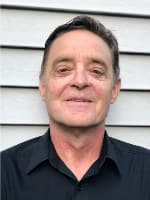
First Snow
(Linc Vannah and Jeanne Hergenrother)
by Robert Racicot
Rob lives within walking distance of the French River in south central Massachusetts and hikes the many miles of Army Corp trails along the river with his dog Ginger.

The background coffee shop voices
morph into a steady white buzz
like Rocky Mountain October snow
silently falling in phase,
tiny parachuted invaders
besieging a rock-walled aspen grove.
I travel inside myself,
back through every first snow;
nothing compares to this place
where I stand inside
the planet’s largest living body.
Born of one root,
each tree equal
in worth, in line, in step,
like snow-winged armies
marching off to fight,
survive and propagate
in Colorado’s aspen fronts.
I crave her forest breath,
feed back my burnt carbon;
like the moon and tides, in and out,
again and again, we are in sync,
tuned musicians amplifying waves.
We are one and I am
least alone
hidden inside
her still
white
blanketed
body.
© Robert Racicot
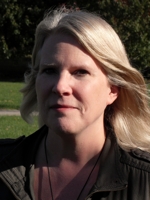
Feral
by Laura Grace Weldon
Laura lives on a small Ohio farm where rain rushes toward Little Sweetly Creek, enters the Black River, merges with Lake Erie, and then the St. Laurence River on it its way to becoming the ocean.

Moonlight leaks through the curtains.
I lie awake, listen to coyote songs
circle and connect, stitching together
the night's raw edges.
Each time I hear their howls
my bone marrow sings.
What's muzzled in me lifts.
I seem silent and still,
yet my pulse races through the trees.
First published by Shot Glass Journal
© Laura Grace Weldon

Owl Delusion
by Lois Levinson
Lois lives at 5,600 feet at the western edge of the Great Plains and in view of the front range of the Rocky Mountains. She loves to wander in riparian and montane habitats in search of birds.

There's a barn owl
perched high in a tattered
cottonwood near the lake,
a stately white bird with
a heart-shaped face
and enormous dark eyes,
still as a marble statue.
I study the image in my scope,
offer a look to passers-by,
but none of them can see the owl.
The bird doesn't move a feather.
He doesn't blink.
I'm not sure he's breathing.
The thrill of finding the raptor
begins to dissipate
in a downdraft of doubt.
What if it's not an owl,
but an apparition
made from peeled bark,
desiccated leaves,
reflected sunlight,
and angst?
Why not a large white bird–
a phantom,
a portent,
a sign of hope
in this wretched time?
An owlish shape
made out of light, shadow
and need,
an illusory joy,
this owl
that is not,
strictly speaking,
there.
© Lois Levinson

Waiting for the Rain
by Rogelio Luque-Lora
Rogelio grew up in the Guadalquivir watershed in Spain and currently lives in the Anglian river basin in England.

Drought
The last couple of goats walk into the pen and Cáscaras pulls the gate shut.
‘Every day looking up at the sky, desperate for it to rain.’
Antonio presses the inside of his boot against the ground, and with a sideways flick pushes dust into the air.
‘If we just got 15 litres the grass would start to come out. The air would change, the trees’d change… even we’d change.’
It is late September and it has not rained since May. Even when it did rain in spring, it did so scarcely. The countryside has been thirsty for a long time. In a good year, with well-timed rain between autumn and spring, our livestock need no feeding: the land provides. But this year we have already been feeding them for months. There is still some browsing left up in the hills, but we cannot take the animals there as they would have nothing to drink.
We say goodbye to the goatherd and drive home. The road cuts through our farm and, looking from side to side, Antonio voices his worry about how little it would take for these hills to catch fire. A cigarette butt, the smallest of sparks. Or a vindictive poacher seeking retaliation for having been caught shooting wildlife on our land. His grip on the steering wheel tightens.
‘Sometimes when I’m in the living room on my own in the afternoon, when it’s too hot to be outdoors, I wake up thinking I can smell smoke and hurry outside – but there’s nothing. One worries to the point of imagining things that aren’t there.’
I have heard him say this countless times now, but he looks just as stressed as always. He glances at his forearm, locks eyes with me:
‘My hairs stand on end just thinking about it.’
I am sitting at my desk, and through the window can be seen a curtain of dust blowing Eastwards: our soil being taken away from us. Anxious, I resolve to walk.
It is just before sundown and a full moon has risen. The red sun to the West, the pale moon to the East, and the land hanging in between.
The cows are all crowded in the field adjacent to our garden, the only place where the water troughs are fed from a well. It is painful to watch them standing so still – nothing on the ground for them to graze on, nothing to tempt them out of their stupor.
I have not walked long before all the cattle have been left behind me, and I am left alone with the trees and the wildlife. Our farm is a dehesa: a Mediterranean forest which has been thinned to allow direct sunlight to reach the soil and create pasture. But the pasture is mostly gone now, the sweet-scented yellow of dry grass replaced with a dusty and depressing brown.
I continue down the path with the regular tapping and rasping of my walking stick for company. My eyes jump from oak to oak, and I love the individuality that is granted to each of them by the open space around them. Each has grown in its particular way, free of the shading influence of its peers.
And I root for them, like they must be rooting for moisture. This year’s crop of acorns is heavy, but if the drought continues the trees will drop them before they are ripe, and the livestock will not take to them as keenly.
I leap across dry gullies and walk in empty spring beds. Painful signs of the absence of that which has shaped this landscape. I reach our shrinking reservoir, and a flock of cormorants takes to the air in rising spirals. When they are perhaps 90 feet above me, they straighten their flight towards the public reservoir at the bottom of the valley.
I head home. On my way back I am startled by the hollow sound of a green acorn hitting the baked ground.
It is now October and the days are shorter, but the heat and drought remain. These are two things which do not fit together in our minds: short evenings should go hand in hand with rain and dropping temperatures. Meteorological dissonance suffuses the air and the land.
Antonio is waiting for me by the tractor, onto which is hooked a trailer stacked with straw bales. He sees me and gets in the tractor, and I jump on the trailer and we set off. Paths have a two-inch layer of dust on them, which the tyres scatter into the air.
Upon hearing the engine, cows flock towards us at an excited trot. They trail behind us in almost single file. At Antonio’s command, I unfold my penknife and cut the four strings that bind together the first of the bales. With each cut there is a thud as tension is released and the bale expands. With the fourth cut the ends of the bale drop either side of the trailer. The cows set to eating the dry straw.
When I have dispatched the last of the bales, I use the bundle of strings I have collected to brush the remaining straw off the surface of the trailer. Antonio stops the engine and joins me. The field is strewn with square mounds of straw, cattle congregated around each of them. They are all pregnant: we have been separating mothers from the rest of the herd as soon as they have given birth, and Antonio tries to judge which will be the next ones to deliver. He gives me his worried look again.
‘I look at them and I’m scared to think about what’s still to come.’
The land is very quiet, and we cannot help wondering where all the wildlife has gone. I think: how cruel that the lives and deaths of so many creatures are determined by the most impassive of forces.
Rain
On October 14th Antonio noticed the cows frisking. The weather’s about to change, he said.
On October 17th I watched from the kitchen window as the sky darkened and the wind shook the leaves on the apple trees. It was no summer wind – too fresh and fickle.
And at 5pm on that day water started to fall out of the sky. How strange the idea of this had seemed in the preceding months. And yet all around us autumn was finally unfolding.
As is often the case in arid and semi-arid regions, when the rain finally came it did so with great energy. Hail, lightning and thunder enveloped us until after dusk. In our excitement we did not even think about the soil runoff which must have been taking place, but this was a price we were very willing to pay for water which we could barely go without.
It is difficult to articulate the joy and relief we experienced that day. I realised then that the land was not the only thing which had become parched during the drought. Rain can be refreshing for the mind and heart as well as for the soil.
Another strange thing happened that evening as clouds discharged their contents onto the ground around me. I was filled with memories of winters spent on the farm as a child. Times when the grass was soft and thick, and the streams ran and the frogs croaked. As if these memories had lain under the dust and were now being unearthed by the raindrops pouring onto it.
That night, despite the cooler air, I went to bed with the windows wide open. Listening to the rain, I imagined it falling on each of my favourite spots of the farm. I paid my full attention to the sounds that filled the room. I listened to the land through the rain, in the same way that one can hear the trees through the wind.
On the following day I walked and rode on horseback and walked again. The countryside smelled of autumn: the rich scent of dry grass which has just started to rot, the earthy smell of watered soil. The sounds were autumnal too: wherever it was that the birds had been hiding when the drought got too much, they had all emerged now.
Mosses also awoke from their dormancy. Over the summer they had become dry crusts on the bark of oak trees and were barely noticed. But with astonishing speed they had now puffed up and glowed with green fluorescence.
The trees, cleaned of their dust, gleamed, and the haze washed out of the air. Millions, billions of seeds germinating, and bacteria mobilizing in the soil under my feet.
The soil… which held so many promises.
Drought
Those promises were never kept, or at least they had not yet been kept when I left the country in the middle of January. That autumn we got frustratingly, despairingly, small amounts of rainfall in a few isolated pockets. The grass never fully emerged, and I have found few things as depressing as the sound of the well pump filling the troughs as late as December. I left without having seen the springs running, and by the time I returned in late June the rainy season was already over.
For weeks and months I walked on dry ground and, like Cáscaras, often found myself looking up at the sky with a clenched heart and an air of resignation. Only where the ground is level and the scant moisture accumulated, a scatter of green lay between what little dry grass there was left and the dusty soil. Slopes remained barren and brown. On the rare occasions when some rain fell, I was overcome with sudden surges of wishful hope, before Antonio’s sobriety brought me back to reality.
I have lived abroad from the age of eighteen, and since then that autumn was the only time that I have been able to spend several months continuously on the farm. It is impossible to fully suppress the thought that if I had picked any other year to go back, I would have had a merrier time.
But the more I entertain that thought, the more I realize how much I would have hated not being there when the land was suffering to suffer with it.
© Rogelio Luque-Lora
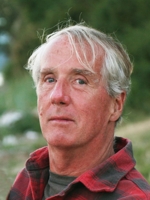
In Mid-January
by Mike Dillon
Mike lives in a small town on Puget Sound within view of the Olympic and Cascade mountain ranges and a few miles from Chief Seattle's grave.

It was late afternoon
when the darkening road
led us into the forest.
I kept the headlights on bright
down the long corridor
of emptiness
where a doe drifted
out of a wall of firs
with the clarity of a dream
and froze. Deeper in, an owl
sailed heavily through our headlights
like a shot across our bow
from one dark wall to the other.
On we flared in silence,
my wife and I. Watchful,
until we emerged from the trees
and saw pale rush light
dwindling beyond crow-black hills
and the last pewter gleam
upon a river’s slow muscles
before its dark turn.
© Mike Dillon
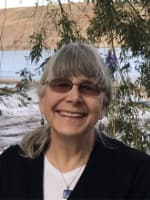
February, 2008
Stone County, Arkansas: Margaret’s Room
by Elizabeth L. Harris
Elizabeth lives in the Ozark Mountains of North Arkansas near the banks of the White River. A few hundred yards upstream the White is joined by Sylamore Creek, and farther north the Buffalo National River is a major contributor to the flow, especially apparent during flood times.

It’s impossible to tell if Margaret made her bed before she went to work yesterday, but I suspect she did because she likes things neat, fabrics hung or folded, displayed to their best advantage. She has cottons, linens, antique Irish lace, heavy wool blankets in surprising pastels, bolts of silk; things given to her, inherited from her Irish family, purchased in Greece where her sister lives, or locally from various craftspeople. The allure of them sometimes claimed her last dollar or drachma.
This morning her wooden bed, with its antique head and foot boards, is in its usual place beside the nightstand in the corner, though the bedding is in disarray; pillows at the foot, articles of wet clothing, mattress cover loose above a filthy bed skirt. More mud-streaked fabric, perhaps a top sheet, hangs unevenly below the foot board. Scraps of photos, artwork, clothing and letters litter the floor. A flared white lampshade forms a tilted bridge between the bed stand and the bed.
Iridescent snowflake motes swirl upward, weightless as dust. Two narrow boards that were not necessarily part of this room, or even this house, when the sun went down last night protrude over the top of the wall. Where yesterday there had been a ceiling and a roof, these broken slats now provide the only cover. A dark article of clothing, perhaps a dress or robe, hangs twisted from one of these planks caught by its sleeves. It dangles just above the headboard, against the gashed white wall.
Beyond this room is the rest of the house, similarly destroyed, and beyond the house the road and all along the road the other houses, transformed at least as much. Beyond this road is our town with its hospital smashed, doctors’ offices crushed, ambulance service swept away. As well as I thought I knew this land, I can’t remember what should have stood here in that empty space or where those piles of siding, splintered trees, and crumpled vehicles were before last night. Because the tornado extinguished the power, cable and phone lines for the entire county we don’t know how far this damage stretches or who else was in its path. I only know what I can see. I have driven as close as I could and then walked to Margaret’s house. I know this was her bedroom and that she wasn’t home when the tornado came.
© Elizabeth L. Harris
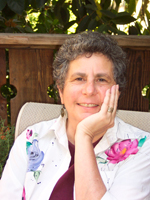
How You Kill an Elephant
by Susan Cohen
Susan spends much of her time looking for birds in both the San Pablo Bay and the Bodega Bay watersheds of Northern California.
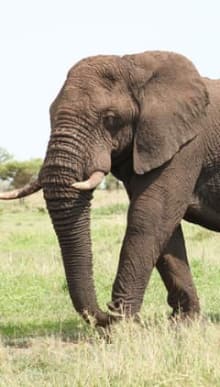
In Africa, where they herd horizons and shuffle up the dust,
you can track their footprints and imagine the size of their lives—
their enormity, their gravity, how little their dailiness has to do
with you. Closer, they slow-walk as if each bears a burden,
and you can see their hides—creased treasure maps,
gray walls daubed with prehistoric handprints.
When they take turns tusking the soil for salt, or cross
the river in a line—trunks aloft, each baby a submersible—
you can move close enough. Then, if you want to kill
an elephant, you must aim for its abundant heart.
Later you can kneel, posed beside a mountain
of carcass that makes you look small.
© Susan Cohen

Reading the Leopard
by Susan Cohen
Susan spends much of her time looking for birds in both the San Pablo Bay and the Bodega Bay watersheds of Northern California.

Its skin in early daylight
was like an illuminated manuscript,
though its eyes held us off, illegible.
One leap into the Jackalberry tree
beside our Land Rover—
then it slid along a limb above us,
where its strip of stinking meat
hung like jerky. No one moved
except to breathe. Only when it headed
down the bark, vertical as a lizard,
last night’s kill in its jaws,
did we recognize the leg and foot
of a baby elephant flopping
with each step the leopard took
back into the bush. Not right, not wrong,
just the fly-blown standard grammar
nature puts into a cat’s mouth—
the elephant’s leg, loose
and linear as the letter l.
© Susan Cohen
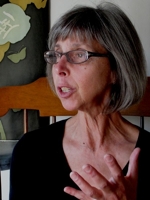
Things We Will Forget about Whales
by Laura Budofsky Wisniewski
Laura lives in the central Lake Champlain Valley, in the Lewis Creek Watershed, a lovely little tributary of which runs through her land. The plants and wildlife of Lewis Creek are currently being threatened by a drastic rise in housing and commercial development.

How the shy ones sang only in the green lagoons of their birth,
how they swam to the last northern light,
how they spoke in the pang of our language
though they longed for the sounds of each other,
how the mothers lifted the corpses
that we would see their sorrow,
and how at the end
they forgave us
as if we would live together
in a kingdom
of blue kindess,
endless.
© Laura Budofsky Wisniewski
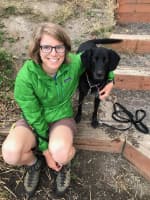
Incertae sedis
by Cara Stoddard
Cara lives along Thornton Creek, a creek managed by the Muckleshoot Indian counsel, home to glacial erratics, newts, herons, spawning salmon, sword ferns, and western red cedar. 90% of the creek that was once an invisible, subterranean network of cement culverts has been "daylighted." Thornton Creek drains into Lake Washington, a part of the Cedar River watershed.

enigmatic taxa
platypus duckweed oleander
bucking neat conformity
straddling categorization
we think we know
what we can never know
from ultrasound
from chromosomes
from what it takes to orgasm
in my driveway
Oregon juncos eat millet
side-by-side the slate-gray race
Mayr said you can still be a species
long distance
across mountain ranges
or whole oceans
as long as when you find each other
you breed
I think of you in your EMT uniform
shoveling gravel out of the bed of your truck
mucking stalls
digging up blackberry
born daughter sister girlchild
you were always your father’s best son
of uncertain placement
The American Ornithological Society
placed the turkey vulture with the falcons
and then with the storks
and then by itself:
Cathartiformes
problematica dresser
boxer briefs lumped
with the sports bras
flamingoes
where there had been loons.
© Cara Stoddard
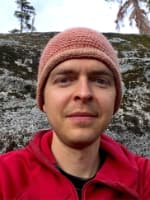
Hanford Reach, North Slope
by Blake Parkinson
Blake resides in the Inland Northwest, roughly two hundred miles east of the Cascade Crest, as the crow flies. He lives on a promontory bounded by the Spokane River to the north and Latah Creek to the west, and begins many mornings by descending to their confluence.

Deep winter finally arrived,
I stay alone inside for days,
can’t see through falling
snow that fills my windows,
blocks the faint sun.
A week ago fog filled these streets,
and Saturday, I woke early,
drove to meet a woman
from my past, two hours there
and two more back, the air so thick
I could see almost nothing.
We met for coffee, then she drove us
out into the desert, where we
hiked along white bluffs and over
rolling dunes, looking down on a river
polluted by plutonium. Not far from here
they made enough for sixty thousand bombs....
We stopped to watch the slow
bend of the water, and though
there was no horizon through the fog,
for a moment an opening, high up
in the clouds, revealed a quiet
February blue— and then was gone.
Desert flora dry and dormant,
fragile leaves bleached white
against the umber sand, I knelt
to take a picture of my hand
next to a line of bird tracks—
their prints everywhere,
but none in the air.
She walked far ahead most of the day,
which was fine—
I stayed behind
to photograph the plants,
the sweeping sand, and her dark,
receding shape, standing out against the grey.
© Blake Parkinson
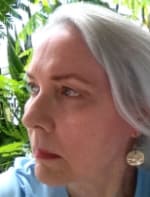
Harvesting Sheds in Jackson Hole
by W.E. Pasquini
W.E. Pasquini lives inland near the Hillsborough River that feeds down into the great bay where the Calusa, along with other ancient tribes, established the ancient town they called Tanpa. She lives just close enough to a wilderness area to see an occasional coyote, fox, or deer.

The Chevy shifts beneath our weight
as we stack elk racks in the rust brown bed.
The air hints of fresh frost and sudden snow,
and our breath freezes around our words—
as delicate as membrane on antlers
in late spring when those veluntinous webs
wrap bone until scraped away against hard bark.
Even in this cold, I sweat. I lift my hand to wipe
my brow and think of how white underbellies melt
snow with their heat and how the trees save the song
of stomping hooves deep inside their sheltered roots.
My own silence swells like ice inside mountain stone.
© W.E. Pasquini
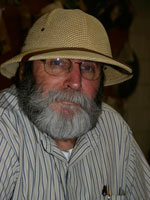
Concern for a Spider
by Bill Gainer
For more than 30 years Bill has lived and worked in the Deer Creek, South Yuba and Bear River watersheds of Northern California.

The web in the blinds
by my desk
keeps getting bigger.
Don’t know
when he works.
I never see
one of those
little wrapped-up
mummy things
they keep their prisoners
in
either.
Not sure he’s eating
at all
let alone
healthy.
Yes, I am concerned
it’s been long enough –
I consider him
a friend.
© Bill Gainer

Brought To You By . . .
by David Dodd Lee
David lives on Baugo Bay, a series of canals surrounded by wetlands, where the St. Joseph River and Baugo Creek meet close to the Indiana and Michigan border.

Did you hear the
shocking news? Did
"You," if you can
still stand yourself,
find yourself taking
a stand? It's just. Well . . .
It makes me
so mad! Beyond the
fading lights
of this city
there is a certain
nightglow. Whales bask
(or die) in it.
Everyone fails
to win always. You
pass an hour in
your car, your face
a thing imagined,
large billboard, blue
showers, steam escaping
through those registered
teeth. You'd like to
kill them all. Get real.
Your walk near the
reeds is shockingly
of no significance
to each member of
your local wildlife
association—a Canada
goose, for example.
© David Dodd Lee
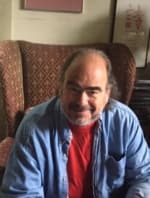
Near Winter's End
by Jonathan Blake
Jonathan makes his home in central Massachusetts along the Quaboag River.

In the fields
a thin fog lifts
From old snow
and the trees stand
In black coats
solemn, as if
Waiting
in the quiet,
After praising
the lonely dead,
For the singing
to begin
Again.
© Jonathan Blake